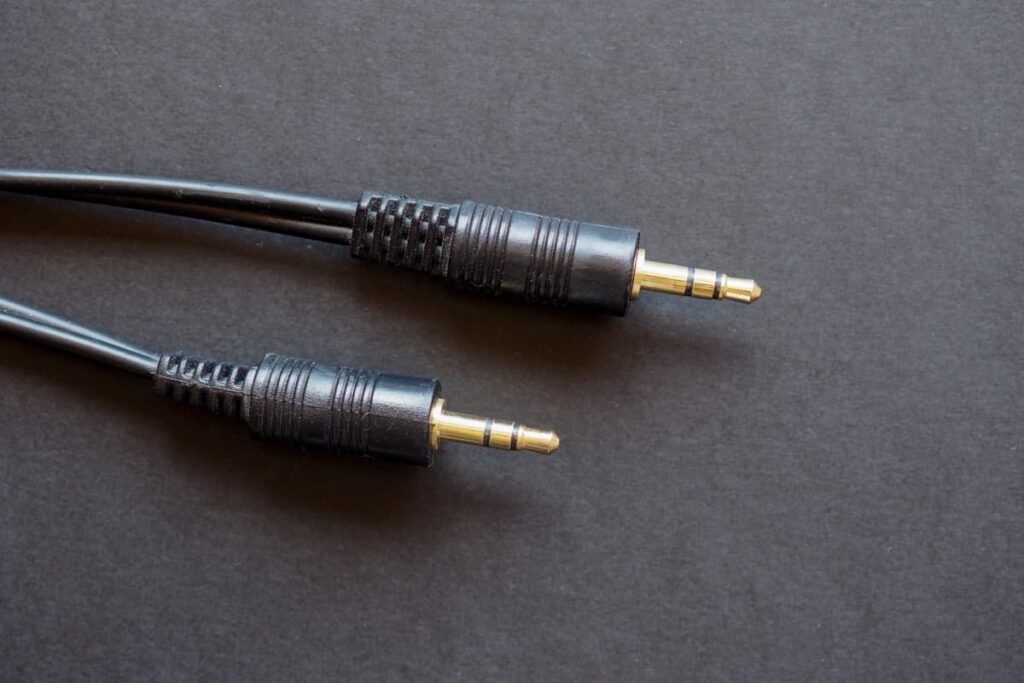3.5mm audio plugs have been standard for decades, as they were the first kind of audio jack we invented, and we’ve just stuck with it all this time. However, their dominance has been increasingly challenged by USB, and more and more audio devices now utilize USB connectors instead of 3.5mm ones. But can they deliver better audio, or should you stick with 3.5mm plugs?
3.5mm plugs don’t deliver better quality audio compared to USB. USB typically provides better audio quality and eliminates noise more efficiently. It is also often easier to use and set up.
Read on to learn more about the sound differences between 3.5mm connectors and USB. This will allow you to pick what’s best for you and get the most pleasure from listening to your favorite music.
Table of Contents
- Why Does USB Provide Better Quality Audio?
- The Advantages of 3.5mm Plugs
- Final Thoughts on 3.5mm vs. USB

Why Does USB Provide Better Quality Audio?
USB provides better audio quality because it transfers information without loss. Furthermore, it wears out more slowly, and it doesn’t depend on the sound card for sound quality.
Let’s take a look at the advantages of a USB port over 3.5mm in greater detail and see why it’s usually the better option.
USB Sends Digital Signals
The biggest advantage of USB is that it transfers digital signals, which your DAC (Digital-Audio Converter) then transforms into audio.
Unlike that, 3.5mm cables, or aux cables, can only transfer analog signals which then have to be converted to a digital signal. This may cause problems with the audio, such as hissing.
USB Doesn’t Use Your Sound Card
Another huge advantage that USB holds is that it bypasses your sound card.
In other words, the USB adapter essentially acts as a sound card and doesn’t require your PC’s card, whether internal or external.
USB Headsets
On the other hand, a headset or any other audio device cannot work without a sound card.
It relies on the sound card to produce the sound, which then transfers the audio signals to your ears. Since most people don’t have high-quality sound cards on their computers, they’re likely to get better sound quality from USB headsets or speakers.
Of course, if you have a truly superior sound card, then you might get a better sound quality from your 3.5mm headset or speakers than from a USB counterpart. However, if you have an average sound card, you’re probably better off with USB connectors.
USB Lasts Longer
3.5mm plugs are prone to getting scratched or otherwise damaged due to their metal surface.
Plugging them and unplugging them many times will wear them out eventually. This will create noise and spoil your listening pleasure.
3.5mm plugs don’t deliver better quality audio compared to USB. USB typically provides better audio quality and eliminates noise more efficiently. It is also often easier to use and set up.
In addition to that, the cables on devices that use 3.5mm plugs tend to be flimsy compared to the ones typically found on USB devices. This is not always the case, as high-end devices tend to have pretty sturdy cables, but on average, they will be more breakable than the ones on USB devices.
These traits positively influence the sound you can get from USB audio devices and mean that you’ll get more out of them compared to their 3.5mm counterparts.
This is on average, of course, and there are surely high-end 3.5mm headsets and speakers that will blow USB out of the water, but for most people, USB would be the better option.
The Advantages of 3.5mm Plugs
While USB seems to take the cake when it comes to sound quality, aux cables have their distinct advantages when it comes to overall performance.
Is 3.5mm better than USB?
Let’s check them out and see if they can be more useful in some scenarios.
3.5mm Analog Headsets vs. USB Headset Versatility
3.5mm audio jacks have been used on pretty much all audio devices until relatively recently.
That means that if, for example, you buy a 3.5mm headset, you’ll be able to use it on pretty much anything. You’ll even get to use them on some old-fashioned devices such as turntables and cassette players.
And considering that these traditional media are getting increasingly popular, the 3.5mm connector still has its place in the world.
Therefore, if you’re looking for a headset or speakers that you can use with all your devices, from smartphones to cassette players, opting for 3.5mm is definitely the right choice.
Fewer Compatibility Problems
Digital connections tend to bother users with compatibility problems.
For some reason, the more advanced technology is, the more there is to go wrong with it. This is not a problem that you can face with a 3.5mm plug.
As long as it is not physically damaged, it will work without giving you headaches and making you mess about with software, wondering what went wrong this time.
Less Power Usage
USB devices tend to drain more power than those with 3.5mm connectors.
This is not a problem with a high-capacity battery or when you’re using a device that’s plugged into an electric outlet.
However, aux is much better when you’re working with a device with short battery life, such as a phone or tablet, or when you want to extend the battery life of your laptop as much as possible, as devices with 3.5mm plugs require very little power to work.
Pricing
On average, devices with 3.5mm plugs tend to be slightly cheaper than USB.
This is because they’ve been around for ages and they’re everywhere, which makes them extraordinarily cheap. They are probably not going to retain that advantage much longer, though.
USB audio devices are getting increasingly more common, and they’ll only get cheaper the more common they become.
Sound Quality
This is where USB has a clear advantage over aux.
The sound quality that you get from a USB connection is significantly better than what you’d expect from an aux cable. This is because, unlike 3.5mm cables, USB can transmit digital data.
This means that there’s no potential for interference or signal loss, so you can be sure that you’re getting the best possible sound quality.
If you’re looking for the best possible audio experience, USB is definitely the way to go. However, if you’re looking for a more versatile or cheaper option, 3.5mm is still a good choice.
Final Thoughts on 3.5mm vs. USB
USB will give you a better sound quality than 3.5mm on your own sound processing system.
This happens because it works only with digital signals, doesn’t rely on the sound card, and tends to be more sturdy and durable, which means that there are fewer adverse influences on the sound quality.
3.5mm connectors retain some advantages, though. They are way more common, which makes them very versatile. They are also a bit cheaper and don’t require as much power to work. 3.5mm devices also cause fewer compatibility problems, which makes them slightly easier to use.
- Review of the ALABS IRON MINI-WL: A Powerhouse Wireless Microphone - October 4, 2023
- What is a Saturator in Music Production: A Brief Explanation - May 11, 2023
- What Are Rotary DJ Mixers? An Overview - May 11, 2023
SoundStudiomagic.com is a participant in the Amazon Services LLC Associates Program, an affiliate advertising program designed to provide a means for sites to earn advertising fees by advertising and linking to Amazon.com. We also participate in other affiliate programs which compensate us for referring traffic.

